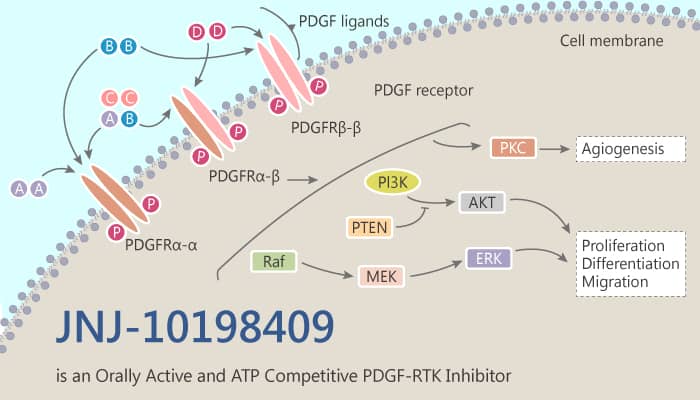As we all know, angiogenesis plays an essential role in the physiology of neonatal development, reproduction, and wound healing. PDGF-BB (Platelet-derived growth factor-BB ) is a mitogenic factor for smooth muscle cells and pericytes. PDGF-BB participates in the later stages of angiogenesis by surrounding endothelial cells to stabilize the newly formed microvessels.
The factor PDGF-BB binds to its cell surface receptor-ligand tyrosine kinase, PDGFR-β.
JNJ-10198409 is a dual-mechanism, antiangiogenic, and tumor cell antiproliferative agent.

Firstly, this compound is a relatively selective, orally active, and ATP competitive PDGF-RTK inhibitor with an IC50 value of 2 nM. It also has potent activity against PDGFR-β kinase with IC50 of 4.2 nM, PDGFR-α kinase (IC50=45 nM). Secondly, JNJ-10198409 exhibits good selectivity against c-Abl, at the same time, shows moderate activity against c-Src and several c-Src-related kinases.
In vitro, JNJ-10198409 has excellent tumor cell antiproliferative activity (IC50 < 0.033 μM) in six of eight tumor cell lines. These cell lines include PC3 (IC50 = 0.027 μM), H460 (IC50 = 0.010 μM), LoVo(IC50 = 0.017 μM), A375(IC50 = 0.007 μM), LnCAP(IC50 = 0.009 μM), and T47D cells (IC50 = 0.032 μM), respectively. Furthermore, In LoVo cells, JNJ-10198409 (0.001-1.0 μM) results in a dose-dependent reduction of phosphorylated PLCγ1 expression.
Secondly, the in vivo pharmacodynamic activity of JNJ-10198409 is investigated.
In vivo, JNJ-10198409, orally administration produces a statistically significant, dose-dependent reduction in tumor growth in human tumor nude mouse xenograft growth delay model. In addition, JNJ-10198409 inhibits mean final tumor area (mm2) to 15%, 64%, and 91% at 25, 50 and 100 mg/kg, respectively. Moreover, tumors are excised intact for subsequent immunohistochemistry analyses.
Positive PLCγ1 immunolabeling presents as brown staining. Detectable immunolabeling in the negative controls does not present. However, the high dose JNJ-10198409 group shows positive pan-PLCγ1 and ph-PLCγ1 immunolabeling in xenograft tumors. This resultant data shows a dose-dependent, statistically significant decrease in the ratio or percentage of ph/pan-PLCγ1.
In conclusion, JNJ-10198409 is a potent inhibitor of PDGF-receptor tyrosine kinase activity, It possesses the ability to suppress tumor growth, as well as inhibit tumor cell antiproliferative activity.
reference:
- D’Andrea MR, et al. Mol Cancer Ther. 2005 Aug;4(8):1198-204.
- Ho CY, et al. J Med Chem. 2005 Dec 29;48(26):8163-73.